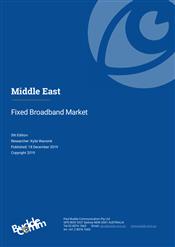2019 Middle East - Fixed Broadband Market

Last updated: 18 Dec 2019 Update History
Report Status: Archived
Report Pages: 97
Analyst: Sebastien De Rosbo
Publication Overview
This valuable report on the fixed broadband sector in the Middle East provides information on trends and developments. The report provides key information, analysis and statistics on the fixed broadband sectors for the following countries: Bahrain, Iran, Iraq, Israel, Jordan, Kuwait, Lebanon, Oman, Qatar, Saudi Arabia, Syria, Turkey, United Arab Emirates and Yemen.
Researcher:- Kylie Wansink
Current publication date:- December 2019 (5th Edition)
Executive Summary
Fibre-based broadband growing in the Middle East
The deployment of fibre-based broadband infrastructure has attracted increased interest in many markets of the Middle East due to the rising demands on data from consumers and enterprises alike. Many countries are also recognizing that high-speed fixed broadband infrastructure will be required to underpin the current 5G evolution and provide the backbone for smart cities overall.
While broadband access based on DSL technology has been prevalent in many Middle Eastern countries, this is slowly changing in some markets, with fibre-based deployments increasing. In Saudi Arabia, for example, DSL subscriptions still accounted for the largest proportion of fixed broadband subscriptions in 2019, but fibre-based broadband subscriptions are growing faster. A similar situation is underway in Bahrain where DSL subscriptions still hold the majority market share – but have been declining since 2013 in favour of fibre broadband.
This increased interest in fibre-based broadband is also leading to innovation and new initiatives in some markets of the Middle East. In Lebanon, for example, the incumbent, Ogero, became one of the first in the world during 2019 to conduct a commercial trial of a fixed network slicing solution deployed to its FttH network.
Competition in the wholesale broadband market is improving in some markets as well and infrastructure sharing initiatives are being implemented. Licenses were recently awarded in Lebanon, for example, which allows alternative service providers to operate and supply FttH services to consumers, using Ogero’s government-owned network.
Overall, fixed broadband in the Middle East is becoming a more dynamic and progressive sector with countries like the UAE, Saudi Arabia and Qatar leading the way - and other countries like Iran and Turkey offering potential growth opportunities.
This report provides valuable information, analyses and statistics on the fixed broadband markets of the Middle East and includes the countries of Bahrain, Iran, Iraq, Israel, Jordan, Kuwait, Lebanon, Oman, Qatar, Saudi Arabia, Syria, Turkey, United Arab Emirates and Yemen.
Recent developments:
- While parts of the Middle East are having ongoing civil unrest issues which has stagnated telecoms developments (e.g. Syria, Yemen) – the more stabilised and progressive countries are moving forwards and making significant inroads in developing and progressing fixed broadband infrastructure.
- DSL is still the leading fixed broadband access technology in many markets in the Middle East.
- The UAE, along with Saudi Arabia and Qatar, are considered to have the most advanced FttP/FttH broadband roll-outs occurring in The Middle East.
- By the end of 2022 the Lebanese government aims to cover the entire country with fibre-based infrastructure.
- Operators are beginning to utilise the wholesale fixed broadband network in Bahrain.
- Fibre-broadband access is expected to increase further in Kuwait, in line with the ongoing national fibre network deployment.
Companies mentioned in this report include:
Mobile Telecommunications Co (MTC) / Zain, Ooredoo Kuwait (previously National Mobile Telecommunication Co (NMT) / Wataniya Telecom), Kuwait Telecom Company (KTC) / Viva, Batelco, Zain Bahrain, Viva Bahrain, Telecommunication Company of Iran (TCI), Mobile Communications Iran (MCI), MTN Irancell, Tamin Telecom (Rightel), Mobile Telecommunications Company of Isfahan (MTCE), Telecommunication Kish Company (TKC), Iraqi Telephone and Postal Company (ITPC), Asiacell, Zain Iraq, Korek Telecom, Regional Telecom, Cellcom, Orange (Partner), Pelephone (Bezeq), HOT Mobile, Golan Telecom, Rami Levy, Jordan Telecom Group/Orange, Zain Jordan, Batelco/Umniah, Saudi Telecom Company (STC)/Bravo, Integrated Telecom Company (ITC)/Bayn Consortium, GO Telecom/Etihad Atheeb, Mobily/Ettihad Etisalat/Bayanat Al-Oula, Zain KSA, Lebara KSA/Etihad Jawraa, Virgin Mobile Middle East & Africa (Virgin Mobile MEA), Axiom Telecom, VIVA, Etisalat, du, Jordan Telecom Group/Orange, Zain Jordan, Batelco/Umniah, MTC Touch, Alfa Telecom, Ooredoo Qatar, Vodafone Qatar, OmanTel, Ooredoo Oman, FRiENDi, Majan Telecom (Renna), Samatel, Syrian Telecommunication Establishment (STE), MTN Syria, Syriatel, Turkcell, Vodafone Turkey, Avea.
Kylie Wansink
December 2019
Related Reports
- Middle East - Mobile Network Operators and MVNOs
- Middle East - Mobile Infrastructure and Mobile Broadband
- Middle East - Fixed Broadband Market (Bundle 11 reports 2022-2023)
- Oman - Telecoms, Mobile and Broadband - Statistics and Analyses
- Jordan - Telecoms, Mobile and Broadband - Statistics and Analyses
- Bahrain - Telecoms, Mobile and Broadband - Statistics and Analyses
- Turkey - Telecoms, Mobile and Broadband - Statistics and Analyses
- Lebanon - Telecoms, Mobile and Broadband - Statistics and Analyses
- Israel - Telecoms, Mobile and Broadband - Statistics and Analyses
- Saudi Arabia - Telecoms, Mobile and Broadband - Statistics and Analyses
Share this Report
TMT Intelligence
A platform to scale your intelligence tasks
Monitor critical insights with our AI-powered Market Intelligence Platform gathering and analyzing intelligence in real time. With AI trained to spot emerging trends and detect new strategic opportunities, our clients use TMT Intelligence to accelerate their growth.
If you want to know more about it, please see:
Research Methodology
BuddeComm's strategic business reports contain a combination of both primary and secondary research statistics, analyses written by our senior analysts supported by a network of experts, industry contacts and researchers from around the world as well as our own scenario forecasts.
For more details, please see:
More than 4,000 customers from 140 countries utilise BuddeComm Research
Are you interested in BuddeComm's Custom Research Service?
Hot Topics
News & Views
Have the latest telecommunications industry news delivered to your inbox by subscribing to BuddeComm's weekly newsletter.